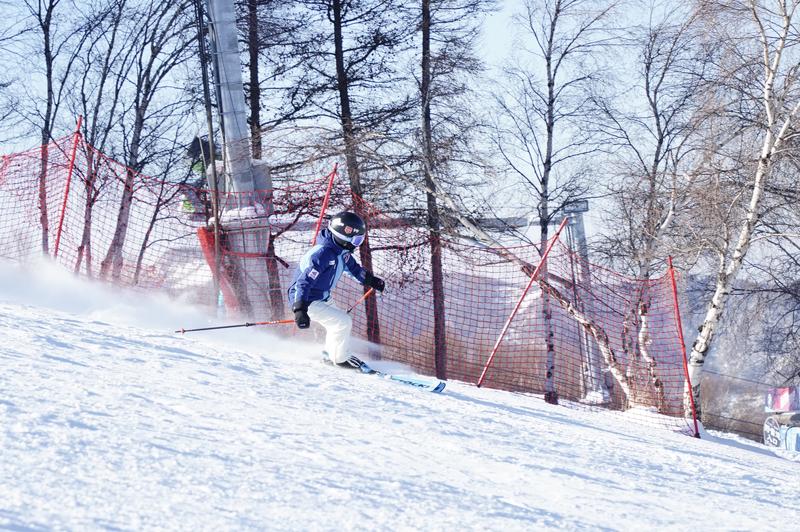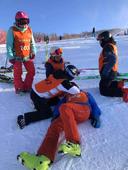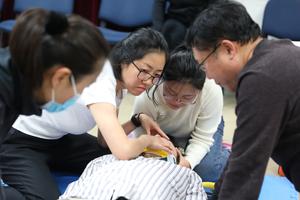Doctor endures intense training to qualify for elite medical team at upcoming Winter Olympics, Wang Ru reports.
 Fu Yan, a member of China's medical service team for the 2022 Beijing Winter Olympics, practices skiing at Wanlong Ski Resort in Hebei province in December. (PHOTO PROVIDED TO CHINA DAILY)
Fu Yan, a member of China's medical service team for the 2022 Beijing Winter Olympics, practices skiing at Wanlong Ski Resort in Hebei province in December. (PHOTO PROVIDED TO CHINA DAILY)
Skiing is a recreational activity that Fu Yan enjoys with her friends. Occasionally, they go for a leisurely ski and then have lunch together. She never imagined that she would one day be so involved in the sport.
When the Beijing Administration of Traditional Chinese Medicine was recruiting doctors in 2018 to offer medical care to athletes participating in the 2022 Beijing Winter Olympics, the doctor from Xiyuan Hospital of the China Academy of Chinese Medical Sciences signed up without hesitation.
"The recruitment is closely related to my profession, and I believe it would be great if I had the chance to use what I learned to do something for the Winter Games," says Fu who works at the emergency department of the hospital.
After more than three years of painstaking effort, the 38-year-old has become a qualified ski doctor ready for the Winter Games, and she says she is "confident" she will do her job well.
Back in 2018, Fu stood out among many other applicants with her proficiency in medical care, skiing and the English language. After several rounds of screening, she became a member of the team providing medical care to alpine skiers.
Alpine skiing is a sport with a high risk of injury, so ski doctors like Fu need to be ready to treat the injured. "If we are called to attend to the athlete on the slope, it means the athlete must have been badly injured," Fu says.
"We would be on duty at many medical sites. If we were informed of athletes falling on the slope and needing medical care, we would ski to the athlete immediately, offer treatment, and help transfer the injured out of the competition slope."
 Fu simulates treating an injured athlete on the slope at the resort. (PHOTO PROVIDED TO CHINA DAILY)
Fu simulates treating an injured athlete on the slope at the resort. (PHOTO PROVIDED TO CHINA DAILY)
In preparation for the job, Fu had to improve her skiing capabilities. Although she could ski on the advanced slopes as a skiing enthusiast, she realized there was a wide gap between her recreational skiing and that required of a qualified ski doctor.
"I remember when I first skied under the guidance of a professional tutor, I felt like I was unable to ski. My previous way of skiing was problematic in the eyes of the tutor," Fu says.
When the Games begin, Fu and her colleagues need to ski on the steep icy slopes with medical equipment as heavy as 15 kilograms on their backs. "The International Ski Federation requires us to reach the injured in four minutes, so we need to hone our skiing techniques until we can ski easily as if we are walking and running on the slope," she says.
"First, since the slope is very steep, we can be easily frightened and that fear can often lead us to tumble, so we need to psychologically brush off the fear. Then, we need to improve our physical capabilities like cardiopulmonary function, ability to maintain balance and joint flexibility."
Every snow season, Fu and her teammates will gather at the National Alpine Skiing Center on Haituo Mountain in Beijing for high intensity training for more than 20 days. They practice skiing under the guidance of tutors in the daytime, and do some medical rescue drills in the evenings.
Shen Aolun, Fu's ski tutor, says Fu does her best to find time to train outside of group training despite her busy schedule.
"There are not many female ski doctors on the team and generally speaking, male doctors perform better on the snow, but Fu didn't want to lag behind," he says. "From the very beginning, she worked very hard to improve her skiing techniques. Even when she was badly injured, she still endured the pain and continued with training."
Fu found she was lacking in strength and physical fitness while doing the drills, leading to swollen knees every day after high intensity training. Sometimes, it was so painful that she had to take painkillers.
"After the snow season, I started to work out. From slow to fast walking, walking combined with running, long-distance running and fast running, I exercised for a year and lost 15 kg. So I enhanced my physical fitness and became more flexible on the slope," Fu says. She and her other team members can now ski to injured athletes in just one minute.
 The doctor (second from left) undergoes training at Beijing Emergency Medical Center in November. (PHOTO PROVIDED TO CHINA DAILY)
The doctor (second from left) undergoes training at Beijing Emergency Medical Center in November. (PHOTO PROVIDED TO CHINA DAILY)
Aside from physical challenges, Fu found applying the medical techniques she was familiar with on the slope very difficult. For example, cardiopulmonary resuscitation, or CPR, is a common emergency procedure doctors use to save people, but it becomes much more difficult to administer it on the slope than on the ground.
"We need to choose the angle to do chest compressions, and consider what movements we should make to remain stable on the steep slope without falling. Moreover, doctors often take turns to do CPR, so how we change our positions is a problem we need to consider," Fu says.
In temperatures between -20 C and -30 C, doctors often find their hands frozen not long after taking off their gloves, and they may not be able to perform precise medical procedures well with frozen hands. Thus, Fu practiced performing the procedures on a mannequin in the hospital to form muscle memory, so that her hands can perform the procedures as quickly as possible, finishing them before her hands become frozen.
Many ski doctors were injured during the training sessions. Fu had bone spurs on her feet, swollen knees, and once had a fracture in her arm. Her family and friends advised her to give up, but she refused as she wants to offer her services at the Winter Games.
Fu says that China seldom organizes professional ski doctor teams, so they are continuously exploring and gaining experience this time. "Some medical officers went to Sochi where the 2014 Winter Olympics was held to consult local professionals and gain experience to guide our training," she says.
"Moreover, since our team members come from different departments of the hospitals, we discuss with each other on many details like which medicine we should use and what postures we should adopt in different situations to administer medical procedures during the Winter Games."
At the beginning of last year, Fu and her teammates successfully provided medical care at the 14th National Winter Games.
"Since we practiced on very difficult situations during our drills, we could easily solve real-life problems during the games," she says. "The uncontrollable accidents we had imagined didn't happen, so the whole process was successful."
Contact the writer at wangru1@chinadaily.com.cn


